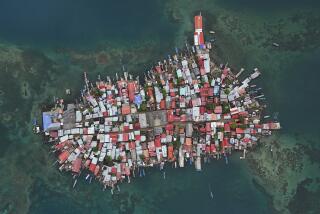Gulf Refugees Add to Woes in Philippines : Economics: Aquino’s government faces the loss of its biggest overseas source of revenue--labor.
- Share via
MANILA — Nestor Ilarde’s tale of terror is emblazoned on his jacket: “Iraq War Victim.”
Ilarde, a 35-year-old Philippine mechanic working in Kuwait, was caught in the middle when Iraq invaded Aug. 2. He saw three Egyptian friends shot to death, he had to walk 12 miles across the blazing desert when his car gave out and he abandoned all he owned to save his life.
“Everything is lost,” he said. “But I am alive.”
Ilarde and the 266 other Philippine workers from Kuwait who flew into Manila airport early today on a chartered jet from Saudi Arabia came back to a nation facing economic and political crisis.
Reflecting the long reach of the Persian Gulf crisis, President Corazon Aquino’s embattled government faces steeply higher prices for imported oil and the potential loss of its largest single source of foreign exchange.
About 500,000 Filipinos have been working in the Middle East, including an estimated 60,000 in Kuwait, 4,000 in Iraq and 374,000 in Saudi Arabia. They send home $1.3 billion a year through banks, and officials estimate that up to $3 billion a year comes back through unofficial channels. That makes labor the Philippines’ most lucrative export.
“We get hit on both sides,” said Alex Magno, a political scientist at the Unviersity of the Philippines. “The price of oil goes up, and we lose remittances by our workers. The consequences are dire, both politically and economically.”
The political impact is evident in the rumors sweeping Manila that an impending oil price increase will spark another attempted right-wing military coup, which would be the seventh in four years. Last Friday, citing warnings of a coup, the armed forces went on red-alert status, the maximum state of readiness.
The economic impact is more certain, however. Officials said impending oil price increases would slow the economy and spark a spiral of rising prices for transport, labor, food and other necessities. Inflation, which reached 12.7% last quarter, is expected to hit 18%. The peso already has dropped to historic lows against other currencies.
“We will not only lose our oil and our workers in the gulf, we have to pay to bring them back,” a Finance Department official said. “And while they’re here, they’re not doing anything.”
So far, the government has used chartered jets and scheduled airliners to evacuate about 1,240 Filipinos who escaped from Kuwait to Jordan and Saudi Arabia. Officials said they are considering sending ships to the region because evacuating everyone by air would cost more than $50 million.
Saudi Arabia has offered to hire up to 40,000 displaced Philippine workers, particularly trained technicians, doctors and nurses, according to Ruben Torres, secretary of labor. But he said only a few hundred of the 60,000 Filipinos in Kuwait have managed to escape.
He said that about 4,000 have crowded into the Philippine Embassy in Kuwait and that about 13,000 have asked for travel documents. Food is being rationed, and chicken pox has broken out, he added.
“We really have to find ways to get food there,” Torres said.
Another 530 Filipinos are in Amman, the Jordanian capital, awaiting evacuation, according to Josefina Bilar, a Labor Department official. “We’re trying our best to get them back,” she said.
So far, the United States has not acknowledged using its giant military bases in the Philippines, Clark Air Base and Subic Naval Station, for the Middle East mobilization. Aquino told reporters Monday she expects the United States to “consult” with her government before the bases are used.
But Stanley Shrager, a U.S. Embassy spokesman, said that under the 1988 bilateral bases agreement, permission need only be sought for “combat military operations.” And that, he said, is not likely, considering the distance to the Persian Gulf.
He said Manila’s permission is not necessary if the Pentagon uses the bases to resupply or refuel planes headed to the gulf, or to resupply, refuel and repair warships.
“That’s certainly conceivable, possible and probably probable,” Shrager added.
For now, attention is focused on the maids, cooks, mechanics and technicians who have come home with their lurid tales of robbery and rape, bravery and despair. The government has said it will file a formal protest with Iraq if the allegations of rape and other abuses can be substantiated.
Marcello Costellas, a 39-year-old refinery worker, helped lead 62 people across the desert in two large dump trucks.
“At the border,” he said, “the Iraqis met us with eight armored cars. After we talked, the officer said, ‘OK, go.’ ”
Salvacion Lazarte, 27, a maid, said she hid in her room for three days after hearing that other women had been raped by invading troops. She left everything when she escaped.
“We had to choose our lives or our things,” she said.
More to Read
Sign up for Essential California
The most important California stories and recommendations in your inbox every morning.
You may occasionally receive promotional content from the Los Angeles Times.














